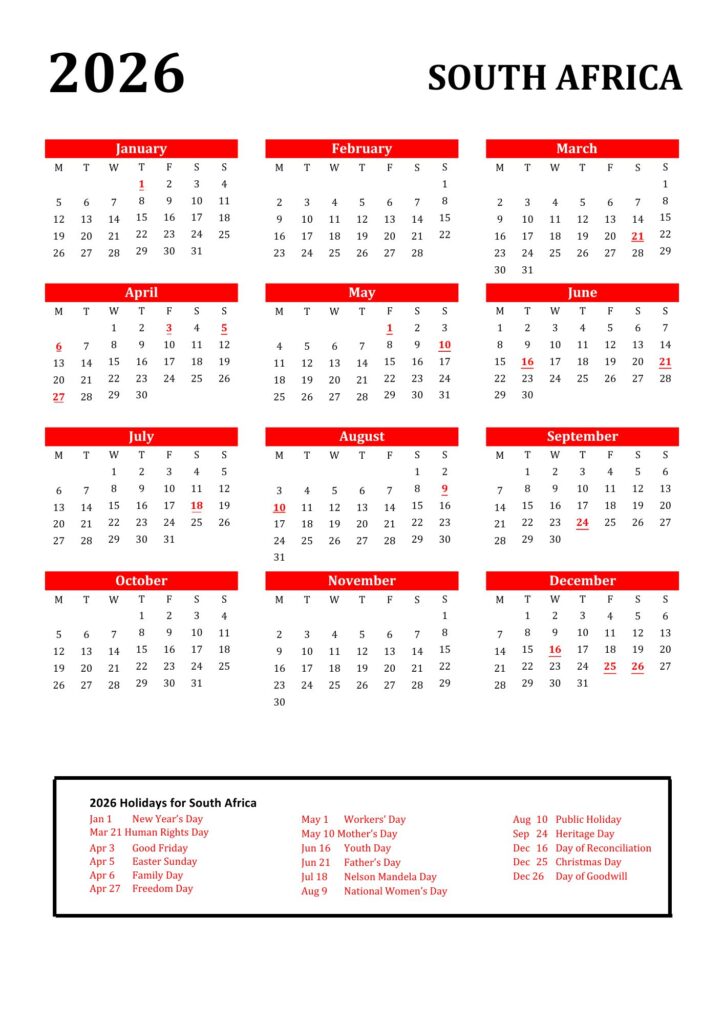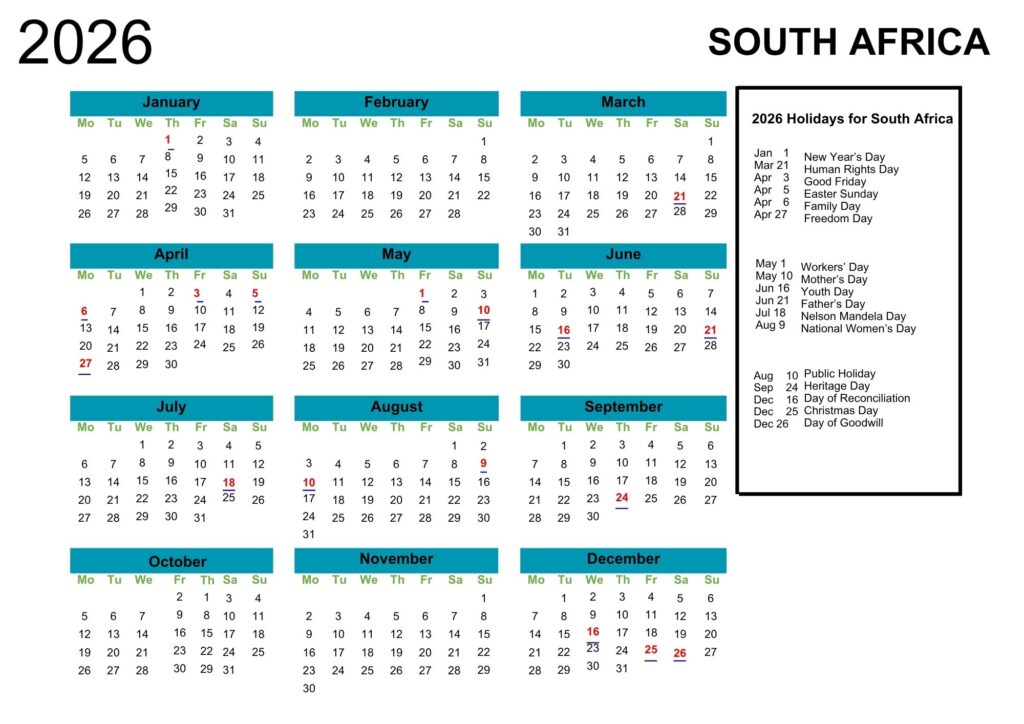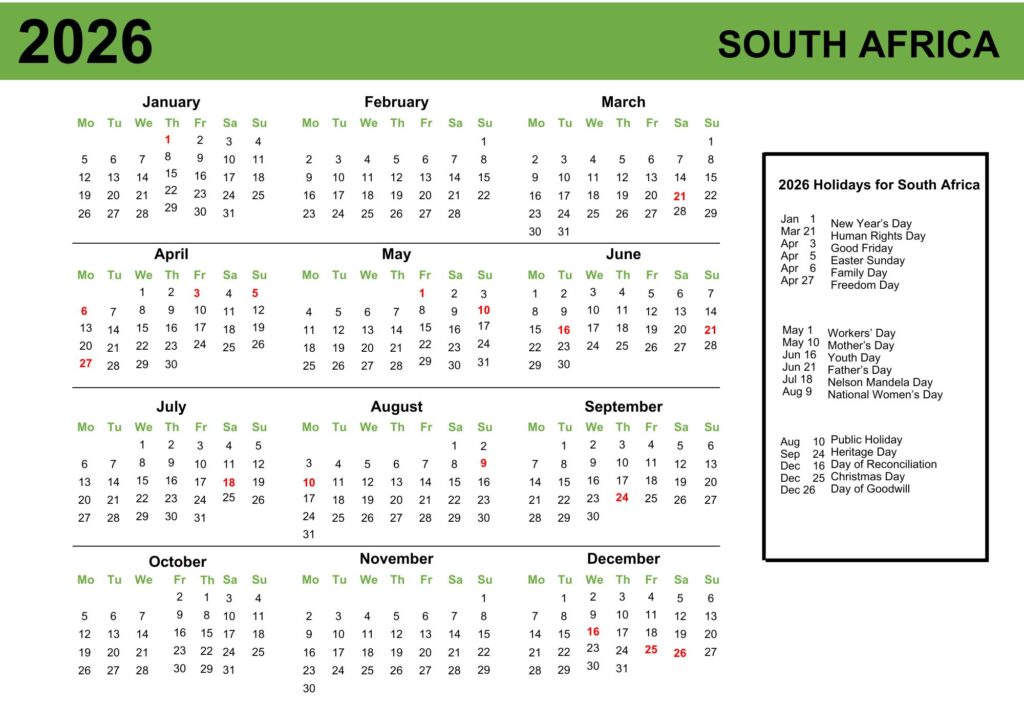South Africa Calendar with Holidays 2026 [Free Printable]
The South Africa Calendar, which celebrates the country’s rich cultural diversity and history, is an annual guide featuring the year’s public holidays and special observances. Among other key national holidays are Freedom Day, Heritage Day, and Human Rights Day, all celebratory times marking the milestones in the country’s struggle for freedom and unity.

The calendar also has been equipped with religious festivals such as Easter, Christmas, and Islamic festivals, including Eid, to recognize the pluralist faith communities of the country. South Africa also shares and celebrates the traditional and cultural values of its people, remembering the heritage customs and the diversity of cultures. As an essential reference for residents, businesses, and visitors, it assists in planning activities around these significant dates that contribute to the national pride, social cohesion, and cultural recognition for all Australians.
Printable South Africa Calendar 2026
The Printable South Africa 2026 calendar is a useful tool for people in a wide range of contexts across the country. This is the place to find out about all upcoming holidays, special days, and celebrations that date is to plan and prepare ahead to get the most out of that special date. For students and teachers, it helps to plan the school calendar, school announcements, and school events. Employers and businesses can easily plan work and project schedules, as well as holiday staffing.

The calendar also features priority personal and family planning with Calendars of family celebrations, organization, cultural heritage, and other significant holidays. The fact that it takes a lot of space after it’s downloaded is a minus, you’d also need to have a phone or tablet with you to be able to use it, and it’s not what everybody wants, besides not doing the device’s battery any good. All in all, the Printable South Africa 2026 calendar is an efficient time management tool that helps users get more done in less time.
South Africa Holidays 2026
| Date | Day | Holiday Name |
|---|---|---|
| Thu, Jan 1 | Thursday | New Year’s Day |
| Sat, Mar 21 | Saturday | Human Rights Day |
| Fri, Apr 3 | Friday | Good Friday |
| Mon, April 6 | Monday | Family Day (Easter Monday) |
| Mon, Apr 27 | Monday | Freedom Day |
| Fri, May 1 | Friday | Workers’ Day |
| Tue, Jun 16 | Tuesday | Youth Day |
| Sun, Aug 9 | Sunday | National Women’s Day |
| Mon, Aug 10 | Monday | National Women’s Day (observed) |
| Thu, Sep 24 | Thursday | Heritage Day |
| Wed, Dec 16 | Wednesday | Day of Reconciliation |
| 25 December 2026 | Friday | Christmas Day |
| 26 December 2026 | Saturday | Day of Goodwill |

New Year’s Day: New Year’s Day completes the celebration of the new year, held on January 1st. It is when South Africans celebrate with parties, fireworks, and cultural activities in the hopes that the new year will bring them all the positivity and hope they need in their lives.
Human Rights Day: Taking place on March 21st, Human Rights Day marks the anniversary of the Sharpeville Massacre in 1960, which was a turning point in South Africa’s opposition to apartheid. This day celebrates and acknowledges human rights, equality, and social justice and is typically observed with the recognition of related events and community programs.
Good Friday: This Christian holy day observes the crucifixion of Jesus Christ. Typically in March or April, Good Friday is celebrated with church services, prayer, and contemplation, symbolizing sacrifice and redemption in the Christian faith.
Family Day: Easter Monday. Family Day is an opportunity for people in South Africa to spend time with family and friends. It is usually spent eating picnics, visiting, and attending family events, and is a continuation of Easter celebrations, not a new one.
Freedom Day: Celebrated on 27 April, Freedom Day commemorates when South Africa had its first post-apartheid elections in 1994 and the end of the apartheid system of racial discrimination and the dawn of a new democratic South Africa. The day is celebrated with parades, speeches, and cultural programs promoting unity and liberation.
Workers’ Day: Celebrated on May 1st as Labour Day, it recognizes workers and labour movements. The day presents marches, rallies, lies, and celebrations in support of workers’ rights and fair labor practices.
Youth Day (16 June): In honour of the youth of 1976 who fought against the imposition on them of the use of Afrikaans during their lessons. It is a day of celebrating youthful activism and the role of education in promoting growth in their lives, through a variety of educational and community-building events and activities.
National Women’s Day: Celebrated on 9th August, this day honours women, especially the 1956 march of women who rebelled against pass laws that locked them under apartheid. It raises the celebration of women’s contributions and supports gender parity with a series of events and conversations.
Heritage Day: Heritage Day is celebrated on 24 September and promotes South African culture and diversity by encouraging South Africans to celebrate their different customs, traditions, languages, religions, and cuisine. It is characterized by cultural displays, costume ppartiesand other community events that bring out national pride.
Day of Reconciliation: December 16th is celebrated as the Day of Reconciliation, focusing on reinforcing the unity and reconciliation within the South African society after a long alienation. It seeks to promote healing and understanding through community events, cultural activities, and contemplation of the nation’s shared history.
Christmas Day: All About Jesus’ Birth & Christmas Christmas Day – December 25, celebrated by many, sometimes with a very confusing mix of Christian and secular practice. It is commonly seen with church services, gift giving, celebrating, and gathering, with the place of emphasis on joy, generosity, and coming together of friends and family.
Day of Goodwill: Celebrated on 26 December, also known as Boxing Day, the Day of Goodwill is for exchanging gifts and sharing with the poor. It is an opportunity for South Africans to let their hair down, catch up on family, and spend time in the service of community or charity, which is in the spirit of goodwill and giving that marks the festive season.
